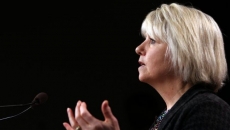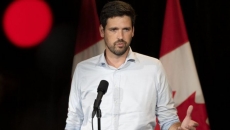Safety concerns in the Sikh community — and the need to "put a chill on India" — played into the choice to publicly reveal a possible link between India's government and the killing of a Canadian, Prime Minister Justin Trudeau said in an interview.
In September, Trudeau made the stunning revelation in the House of Commons that there was credible intelligence linking India's government to the June 18 shooting death of Sikh activist Hardeep Singh Nijjar outside his gurdwara in Surrey, B.C.
The Sikh community in B.C. had been worried about what could happen next, Trudeau said Monday in a year-end interview with The Canadian Press. The prime minister said the message he delivered in the House of Commons that day was intended as an extra "level of deterrence" to keep Canadians safer.
The allegations worsened already strained relations between the Liberal government and that of India's Prime Minister Narendra Modi, which has continued to deny any connection to the killing.
In the interview, Trudeau said his public statement came after weeks of "quiet diplomacy" that included raising the allegations with India at the highest levels.
That included a conversation Trudeau had with Modi at the G20 Summit in New Delhi, where the two met behind closed doors for 16 minutes.
"We knew it would be difficult conversations, but we also knew that this was an important moment for India to be demonstrating its leadership on the world stage with the G20," Trudeau said.
"And we felt that we could use that as a constructive opportunity to work together."
Asked whether he felt those talks were constructive, Trudeau was blunt: "No."
Trudeau said he decided to make the announcement Sept. 18 because he expected that information would be eventually leaked through the media. He wanted Canadians to know the government was on top of the situation.
The Globe and Mail broke the story shortly before Trudeau rose in the House.
"Too many Canadians were worried that they were vulnerable," Trudeau said in the interview this week, adding the Sikh community in B.C. had been raising concerns since shortly after Nijjar was killed.
"We felt that all the quiet diplomacy and all the measures that we put in — and ensured that our security services put in to keep people safe in the community — needed a further level of deterrence, perhaps of saying publicly and loudly that we know, or we have credible reasons to believe, that the Indian government was behind this," he said. "And therefore put a chill on them continuing or considering doing anything like this."
Trudeau also said Canada warned India that what it knew would eventually come out, and that while Ottawa had managed to keep things "on a diplomatic level" leading up to the G20 summit, it could not control much beyond that.
Trudeau also said he did not know whether it would come out through leaks, the public inquiry into foreign interference or because things had reached a threshold "in which we had a duty to protect Canadians" by going public.
Trudeau's Sept. 18 announcement was met with immediate calls for evidence, not just from India, but also from Conservative Leader Pierre Poilievre, who told Trudeau to "come clean."
India responded by temporarily suspending its visa services in Canada and for Canadian citizens worldwide. Canada also removed most of its diplomatic presence from India after New Delhi threatened to strip diplomatic immunities from them and their families. Trudeau called a violation of the Vienna Convention.
"They chose to attack us and undermine us with a scale of misinformation and disinformation in their media that was comical," Trudeau said.
"(It) would have been more comical had it not had real implications for peoples' lives and relations between our two countries that are so deep in terms of people to people ties, and people depending on the flow of connections between us."
India, which is the world's most populous country, reacted differently when United States prosecutors alleged last month that an Indian government official directed a plot to assassinate a prominent Sikh separatist leader living in New York City. The U.S. indictment pointed to a connection with the case of Nijjar.
Rather than issuing an outright denial, India agreed to strike a "high-level" committee to look into the U.S. matter.
A spokesman for the Indian high commission in Ottawa pointed to remarks the country's external affairs minister made in its parliament last week about how the U.S. had provided evidence and Canada did not.
"Insofar as the U.S. is concerned, certain inputs were given to us as part of our security co-operation with the United States," India's External Affairs Minister Subrahmanyam Jaishankar said last Thursday in response to an MP's question.
"Those inputs were of concern to us because they related to the nexus of organized crime, trafficking and other matters. So, because it has a bearing on our own national security, it was decided to institute an inquiry into the matter and an inquiry committee has been constituted."
In Canada's case, Jaishankar said, "no specific evidence or inputs were provided to us." He added: "So the question of equitable treatment to two countries, one of whom has provided inputs and one of whom has not, does not arise."
In the interview, Trudeau said Canada intends to reveal evidence very much in the fashion the U.S. did when "we reach those points in the investigation."
But he noted that U.S. authorities started their investigation into attempted murder earlier.
"Canada is investigating a murder and there are different stakes involved in that and our justice system has different processes," he said. "But that is unfolding."






